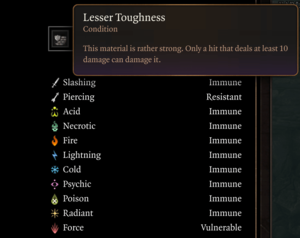Ad placeholder
Resistances
Every source of damage in the game, such as attacks, spells, or traps, has an associated Damage Type. The target may have resistances or weaknesses that affect how much damage it takes from this source of damage.
Damage Types
There are 13 different types of damage in Baldur's Gate 3. They are:
Bludgeoning* |
Piercing* |
Slashing* |
Cold |
Fire |
Acid |
Lightning |
Force |
Poison |
Thunder |
Radiant |
Necrotic |
| - | Psychic |
- |
*Sometimes, the term Physical Damage (stylized as ![]() Physical on the wiki) is used in ability or item descriptions, such as the Rage ability of Barbarians. When you use such an ability, you deal whatever damage type your weapon would deal.
Physical on the wiki) is used in ability or item descriptions, such as the Rage ability of Barbarians. When you use such an ability, you deal whatever damage type your weapon would deal.
Damage Vulnerability, Resistance and Immunity
Vulnerability, Resistance, and Immunity are properties that modify how much damage a target takes from specific types of damage.
Vulnerability
Vulnerability means the total damage taken from a type of damage is doubled.
Resistance
Resistance means the total damage taken from a type of damage is halved.
Immunity
Immunity means the total damage taken from a type of damage is reduced to 0.
Toughness
Toughness is a special property of some doors, chests, and breakable walls that requires a hit to exceed a certain damage threshold in order to deal any damage. The possible levels of Toughness are:
- Lesser Toughness: Only a hit that deals at least 10 damage can damage this material.
- Medium Toughness: Only a hit that deals at least 22 damage can damage this material.
- Greater Toughness: Only a hit that deals at least 50 damage can damage this material. (Not yet implemented in Early Access.)
All modifiers of the hit and vulnerabilities/resistances of the object are calculated first and then checked against the Toughness damage threshold.
There are several ways to beat the Toughness threshold of an object. Here are some common methods:
- Exploiting any specific damage Vulnerability of the material (typically
 Fire for wood,
Fire for wood,  Force for stone, and
Force for stone, and  Acid for metal)
Acid for metal) - Attacking with a Maul using Great Weapon Master: All In to deal high
 Bludgeoning damage
Bludgeoning damage - Using the Shatter spell or another source of high
 Thunder damage
Thunder damage - Igniting Smokepowder Barrels or other explosives
